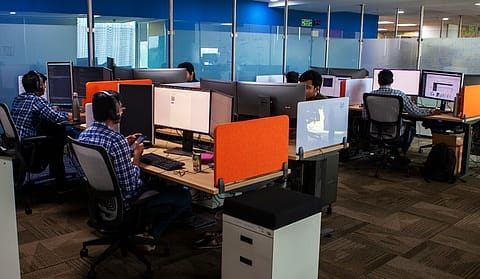Hybrid workplace, flexible policies: India Inc.’s new mantra
88% of business leaders have hired specialists and consultants to help design new workplace policies: LinkedIn report

Workplaces globally are not the same anymore. In India, too, work culture and the way people look at their jobs now are very different from the pre-pandemic era. Employers have realised that as well. According to a study released by LinkedIn on Thursday, 88% of business leaders in India have hired specialists, consultants, and additional personnel to help design their workplace policies for the future of work.
According to the report by the world’s largest online professional, business leaders are creating new workplace policies that give employees more leeway about how they work and where they work from.
The survey—which included 736 respondents from small, medium, and large businesses in India—points out that while preparing for the new hybrid work culture, nine in 10 business leaders in India have already offered or are planning to offer job-sharing possibilities, while 78% have already offered or are planning to allow employees to work from a different country.
“Flexible working has emerged as a top priority in the new world of work, and business leaders see this as an opportunity to hire more diverse talent and improve business performance. Nearly 9 in 10 leaders in India have hired specialists to design stronger workplace policies, re-evaluate everything from L&D [learning and development] opportunities to performance reviews and career progression through a new lens — one that puts people first and not location,” says Ashutosh Gupta, India country manager, LinkedIn.
The study also shows that India is leading in the Asia-Pacific (APAC) region when it comes to offering flexibility; in comparison, only 68% of APAC leaders offer job shares and 58% allow staff to work from a different country.
However, business leaders foresee concerns with offering greater flexibility such as substandard quality of work (39%), lesser collaboration between employees (37%), and dented customer experience (36%). Despite challenges, 83% of India’s business leaders are confident about leading a distributed workforce, when compared to 66% of leaders in the APAC region.
In a post-pandemic market as large enterprises across sectors such as information technology (IT), FMCG, financial services and others look at a hybrid work model—a mix of in-office and remote work—the real estate landscape in India is also likely to see a transformation.
Recommended Stories
“Occupiers are looking to be in new-generation offices with modern amenities with focus on health and wellness. There will be more emphasis on flexibility, with occupiers keen to explore co-working spaces for a decentralised workforce,” says Ramesh Nair, CEO, India and MD, market development at Colliers India, in a recent joint report with Propstack, titled “Evolving office space trends in a post pandemic world.”
“The future is hybrid. Office usage patterns will change, and occupiers will become nimble to maximise efficiency. As occupiers devise their strategies, developers, too, will become more adaptable,” adds Nair.
This October, FMCG major Marico implemented a hybrid-work model for its employees across the country. Under its new ‘Ways of Work’ design, the company will offer greater flexibility, enabling majority of its employees to work from office at reduced but defined frequency, the company noted in a statement, adding, over the next 12-18 months, it will provide location flexibility option for all its employees across grades based on role and individual needs.
IT major Infosys, during a recent earnings call, pointed out that globally, about 97% of its workforce is still working from home. “In October, in India, we are requesting all senior leaders to come to the office at least once a week… we are really working on a model which provides flexibility to employees, but also enables us to react with great speed and agility to whatever is happening,” Infosys management noted during the Q2 earnings.
(INR CR)
The country’s largest IT firm, Tata Consultancy Services (TCS), said in a statement that over 95% of its associates have received at least one dose of the vaccine and over 70% have been fully vaccinated. “We plan to bring back our workforce to the workplace gradually by the end of the year,” the company said.